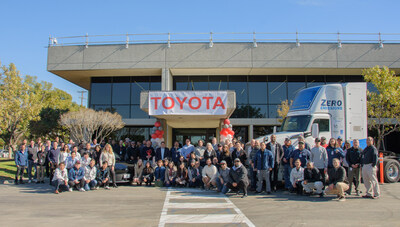Toyota Establishes Hydrogen Headquarters to Accelerate Advancement of Fuel Cell Technology
Rhea-AI Summary
Toyota Motor North America (TMNA) has established the North American Hydrogen Headquarters (H2HQ) to accelerate the advancement of fuel cell technology. The facility aims to research, develop, commercialize, and sell hydrogen-related products, with plans to include a flexible microgrid, customer education center, and more. This initiative reaffirms Toyota's commitment to zero-emission technology and reducing carbon emissions.
Positive
Toyota's establishment of the North American Hydrogen Headquarters demonstrates its dedication to fuel cell technology and reducing carbon emissions through zero-emission solutions.
The facility's plans to include a flexible microgrid, customer education center, and various research and development assets underline Toyota's commitment to advancing hydrogen-related products and technologies.
Toyota's collaboration with industry partners to support infrastructure growth and decarbonization efforts further highlights its leadership in fuel cell technology and sustainability.
Negative
The construction of a flexible microgrid is expected to be fully operational by 2026, potentially posing a delay in implementing sustainable energy sources at the facility.
While Toyota has a strong history of developing hydrogen fuel cell technology, the success of its future projects at the North American Hydrogen HQ remains dependent on market acceptance and adoption of zero-emission solutions.
News Market Reaction 1 Alert
On the day this news was published, TM declined 0.21%, reflecting a mild negative market reaction.
Data tracked by StockTitan Argus on the day of publication.
- H2HQ teams to lead NA region's efforts to research, develop, commercialize and sell fuel cell and hydrogen-related products
- Renovated facility provides a refreshed office workspace, with plans to add features in the future, including a flexible microgrid, customer education center and more
"Toyota has developed hydrogen fuel cell electric solutions for more than three decades, and we will continue to advance this scalable, zero-emission technology as part of our electrified portfolio," said Ted Ogawa, President and CEO, Toyota Motor North America. "Renaming this facility as North American Hydrogen Headquarters represents our leadership in fuel cell development creating real-world products to help reduce carbon emissions."
Last year, Toyota Motor Corporation reorganized its hydrogen business in
H2HQ will drive North American-led hydrogen initiatives and support the localization of global hydrogen-related technologies and products that include light-duty fuel cell applications, heavy-duty fuel cell opportunities, stationary fuel cell power generation, port vehicle applications and more. The facility already provides impressive research and development assets, including Toyota's largest dynamometer (1.2 MW), a scalable test bench for stationary applications, and a hydrogen fueling station capable of providing fuel for both light- and heavy-duty vehicles. Moreover, as part of its plans to remain and grow fuel cell leadership, NA H2HQ will be home to several new projects in the coming years.
"I'm very pleased that Toyota is building on its longstanding commitment to
Construction has begun on a flexible microgrid that features energy sources available today, including a 230-kW solar photovoltaic system, a 1-MW stationary proton exchange membrane (PEM) fuel cell generator, 325-kW solid oxide fuel cell (SOFC), and an onsite 500-kWh battery energy storage system. The microgrid is designed to support the campus' energy needs, allowing it the ability to operate off-grid. The system is expected to be fully operational by 2026.
"
In the future, Toyota's plans for the new North American Hydrogen HQ will include a sustainable education center, available for tours by reservation. The center will be a place for people to learn more about Toyota's vision of sustainability and the role that hydrogen will play.
30+ Years of Development
From creating one of the world's first mass market passenger fuel cell electric vehicles in the Mirai, to applying and scaling the technology now to other applications that can benefit from zero-emissions, including heavy-duty transport, power generation systems, and others, Toyota's research and development with hydrogen fuel cell technology spans more than 30 years.
For much of that time, the
In 2017, to address decarbonization efforts at local ports, Toyota's FCD team helped prove the scalability of fuel cell technology after it acquired a Class 8 truck and fitted it with a fuel cell electric powertrain consisting of two Mirai fuel-cell stacks. This effort then led to a collaboration with PACCAR's Kenworth brand to build 10 proof-of-concept trucks, trucks used to support the "Shore to Store" ZANZEFF project that proved the viability of hydrogen-powered fuel cells as a zero-emission powertrain in heavy-duty applications. PACCAR and Toyota later agreed in 2023 to pursue commercialization of the project, with Toyota supplying the fuel cell powertrain kits from its
Most recently, Toyota has demonstrated a non-automotive opportunity for hydrogen-powered fuel cell technology in stationary power generation. Toyota and TRD partnered to build a stationary unit to provide electricity at events where it was not readily available, launching the first public activation at an LPGA Tour stop where the unit supported the power needs of the event stage and sound system. The solution provided clean, quiet power that was proven to capably replace traditional diesel generators. Last year, Toyota built a 1MW fuel cell electric generator for the National Renewable Energy Laboratory in
About Toyota
Toyota (NYSE:TM) has been a part of the cultural fabric in
Toyota directly employs more than 63,000 people in
For more information about Toyota, visit www.ToyotaNewsroom.com.
Media Contact
Joshua Burns
Joshua.Burns@Toyota.com
![]() View original content to download multimedia:https://www.prnewswire.com/news-releases/toyota-establishes-hydrogen-headquarters-to-accelerate-advancement-of-fuel-cell-technology-302132596.html
View original content to download multimedia:https://www.prnewswire.com/news-releases/toyota-establishes-hydrogen-headquarters-to-accelerate-advancement-of-fuel-cell-technology-302132596.html
SOURCE Toyota Motor North America
FAQ
What is Toyota's new North American Hydrogen Headquarters focused on?
Toyota's North American Hydrogen Headquarters (H2HQ) is focused on researching, developing, commercializing, and selling hydrogen-related products and technologies, reaffirming its commitment to zero-emission solutions and reducing carbon emissions.
What features are planned for the H2HQ campus in the future?
Future plans for the H2HQ campus include a flexible microgrid, sustainable customer education center, and additional research and development projects in fuel cell technology.
When is the flexible microgrid at the H2HQ expected to be fully operational?
The flexible microgrid at the H2HQ is expected to be fully operational by 2026, featuring energy sources like solar photovoltaic systems, fuel cell generators, solid oxide fuel cells, and battery energy storage systems.








